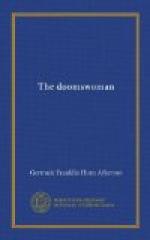III.
In the long dining-room, opening upon the large high-walled garden at the back of the Governor’s house, a feast was spread for fifty people. Dona Martina sat for a little time at the head of the table, her yellow gown almost hidden by the masses of hair which her small head could not support. Castro was on one side of her, Estenega on the other, Chonita by her arch-enemy. A large bunch of artificial flowers was at each plate, and the table was loaded with yellowed chickens sitting proudly in scarlet gravy, tongues covered with walnut sauce, grilled meats, tamales, mounds of tortillas, and dulces.
Alvarado, at the lower end of the table, sat between Dona Modeste Castro and myself; and between the extremes of the board were faces glowing, beautiful, ugly, but without exception fresh and young. From all, the mantilla and serape had been removed, jewels sparkled in the lace shirts of the men, white throats were encircled by the invariable necklace of Baja Californian pearls. Chonita alone wore a string of black pearls. I never saw her without it.
Dona Martina took little part in the talk and laughter, and after a time slipped away, motioning to Chonita to take her place. The conversation turned upon war and politics, and in its course Estenega, looking from Chonita to Castro with a smile of good-natured irony said,—
“Dona Chonita is of your opinion, coronel, that California was the direct gift of heaven to the Spaniards, and that the Americans cannot have us.”
Castro raised his glass to the comadre. “Dona Chonita has the loyal bosom of all Californian women. Our men love better the olive of peace than the flavor of discord; but did the bandoleros dare to approach our peaceful shores with dastardly intent to rob, then, thanks be to God, I know that every man among them would fight for this virgin land. Thou, too, Diego, thou wouldst unsheathe thy sword, in spite of thy pretended admiration of the Americans.”
Estenega raised his shoulders. “Possibly. But in American occupation lies the hope of California. What have we done with it in our seventy years of possession? Built a few missions, which are rotting, terrorized or cajoled few thousand worthless Indians into civilized imbecility, and raised a respectable number of horses and cattle. Our hide and tallow trade is only good; the Russians have monopolized the fur trade; we continue to raise cattle and horses because it would be an exertion to suppress them; and meanwhile we dawdle away our lives very pleasurably, whilst a magnificent territory, filled with gold and richer still in soil, lies idle beneath our feet. Nature never works without a plan. She compounded a wonderful country, and she created a wonderful people to develop it. She has allowed us to drone on it for a little time, but it was not made for us; and I am sufficiently interested in California to wish to see her rise from her sleep and feel and live in every part of her.” He turned suddenly to Chonita. “If I were a sculptor,” he said, “I should use you as a model for a statue of California. I have the somewhat whimsical idea that you are the human embodiment of her.”




